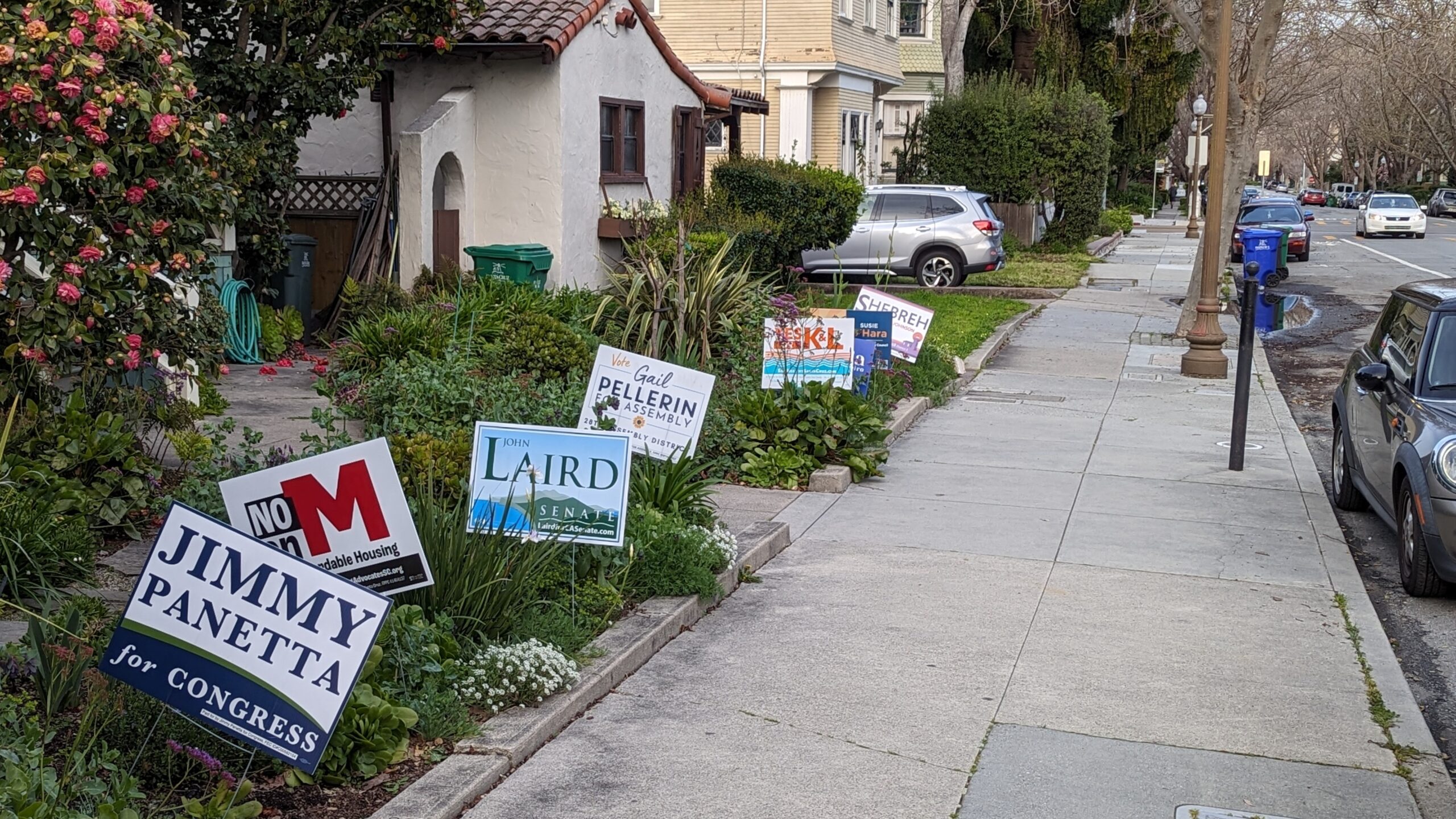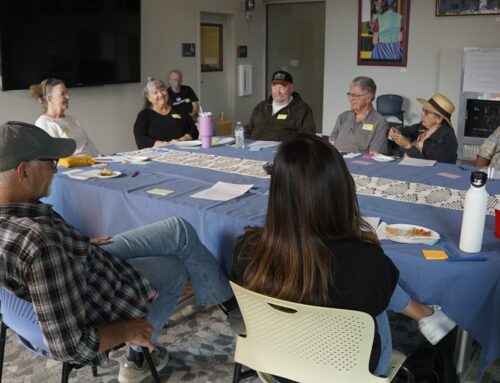
Signs for Measure M and other ballot measures and candidates line Walnut Avenue in Santa Cruz on March 4. (Stephen Baxter — Santa Cruz Local)
Official results as of 5:20 p.m. Tuesday, April 2
M – City of Santa Cruz Housing For People
- No 10,977 (60.59%)
- Yes 7,139 (39.41%)
SANTA CRUZ >> Measure M, the Housing for People ballot initiative in Santa Cruz, lost with about 39% of the vote, according to official election results posted April 2. Measure M needed more than 50% of the vote to be adopted.
Measure M tried to increase the amount of affordable housing in new large developments in the City of Santa Cruz and give residents more say over building heights.
The measure would have:
- Raised affordability requirements to 25% from 20% in housing proposals with 30 units or more.
- Required citywide elections to change building height and density limits.
- Applied retroactively to development applications submitted after June 1, 2023, according to the measure’s text.
Reactions to early results
Santa Cruz YIMBY lead Diana Alfaro said March 6 that she wasn’t surprised with preliminary election results that showed Measure M tilting toward a loss. The group opposed Measure M.
“People understand what it takes to create more affordable housing opportunities and just more housing in general,” Alfaro said. “I’m just very glad that folks went out and really showed their support.”
Frank Barron and Susan Monheit, authors of Measure M, did not respond to requests for comment.
Joy Schendledecker, a District 3 Santa Cruz City Council candidate who supported Measure M, said she was “not shocked” at early results. She said some people she talked to were confused about how to vote, even after speaking with proponents and opponents.
“Both sides are saying that they want more affordable housing, right? But they are saying that there’s like completely different ways of getting there,” she said.
Proponents tee up future bond measure
Some members of the coalition that opposed Measure M plan to propose a bond measure to fund affordable housing, Alfaro said. The bonds could be funded by a parcel tax or property transfer tax, and could appear on the November ballot or a later election.
“It’s still up in the air, but I’m just very hopeful that we can continue making progress to create more housing,” Alfaro said.
Measure H, a Santa Cruz County bond initiative to fund affordable housing, failed in 2018.
Schendledecker said a future bond measure could unite both camps depending on how it is written. Schendledecker said she favors a property transfer tax rather than a flat parcel tax, which she said would affect low-income homeowners more than higher-income owners.
A problem with property transfer taxes is that the real estate industry is less likely to support them, Schendledecker said.
Measure M arguments
Proponents of Measure M have argued that:
- The measure could halt city plans to allow 12-story buildings south of Laurel Street that have faced some community pushback.
- Requiring a public election for zoning changes would be more democratic.
- Raising the number of affordable homes required within a housing proposal would increase the supply of affordable housing.
- The city could still meet state housing goals, and could vote to change zoning to meet future goals.
Opponents of Measure M have argued:
- By increasing the number of affordable homes required in a housing proposal, developers would be discouraged from pursuing housing projects because projects would be less profitable or infeasible.
- The election requirement would reduce certainty for housing developers, and elections would be frequent and costly for the city.
- More housing development, including market-rate homes, are needed to help push down housing costs citywide.
- The measure could prevent the city from meeting state housing goals, which could trigger a state law that removes local control over new housing developments.
To learn more about Measure M, read Santa Cruz Local’s Election Guide.
Questions or comments? Email [email protected]. Santa Cruz Local is supported by members, major donors, sponsors and grants for the general support of our newsroom. Our news judgments are made independently and not on the basis of donor support. Learn more about Santa Cruz Local and how we are funded.
Jesse Kathan is a staff reporter for Santa Cruz Local through the California Local News Fellowship. They hold a master's degree in science communications from UC Santa Cruz.





